Curious Reads: Shocked and Not Surprised
How & Why Donald J. Trump Won the White House... Again.
Hello friend, Liz here.
WHAT THE HELL HAPPENED? This week, we’re discussing the story of Donald Trump’s win. I’ll be reviewing the pundits’ explanations for how and why Trump took the White House (and how the GOP captured the Senate to boot).
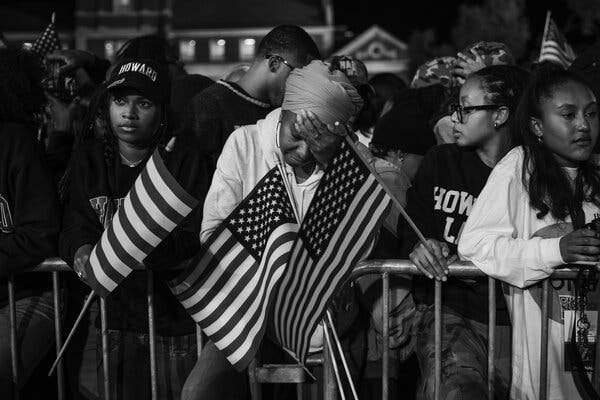
Like many of you, I’ve been reeling over the past few days. I have kept my voice and feelings mostly to myself, though I’ve been sharing plenty of other smart peoples’ thoughts and opinions. (See threads and my Instagram stories.)
Of course I am angry. (What about the climate?! The economy (tariffs??), the state of capitalism, and the ability for the middle class to earn a living?)
Of course I am mournful. (What will happen to my immigrant neighbors? What does Trump mean exactly when he says “American”? What does this mean for orgs who support these populations?)
Of course I feel like this is a step backward in the march toward a more just society. (“I guess we’ll never elect a woman, especially not a black woman.” *sob*)
Amid these ginormous feelings, I’ve been trying to take my own advice to manage my anxiety. I’ve been going on midday walks and/or sweating on an elliptical. I started a new murder mystery series on Audible. I’ve made nourishing meals for my family because it’s finally cold enough for stew! I have texted near constantly with friends, and I even had the chance to eat cheese alongside others who were shocked by the results with me in real time. (Shocked, but not surprised. We’ll get to that.) I even bought myself a “SAD” light, just for the extra boost.
I am also trying my damndest to believe the best about others, even when their vote feels to me like standing up for misogyny, racism, xenophobia, and homophobia. Because the fact is, how people vote is complicated.
That’s what I’d like to talk about today. Because I know that so many of us are still scratching our heads, wondering how the FJ;WLEKFJ;LKJPD did THAT man win the White house AGAIN?! (And how did the Senate come along for the ride?)
By now, a week after the election, a lot of smart people have weighed in with opinions based on data from exit polls, so rather than just spouting an opinion, I’ve compiled a round-up of very smart theories from other very smart people.
Chime in with your own theory and to commiserate, wouldja?
The Highlights: How did Trump win?
Who voted for Trump and Republicans?
Men: Across the board, men carried the Republican party. Nearly half of Latino men voted for Trump, who gained a 12-point advantage over Harris (as opposed to Biden’s 23-point advantage in 2020!). Gen Z men narrowly leaned to the right as well. Even black men moved toward Trump (though nearly 80% still voted Harris).
White people: Here’s a staggering chart for you.1 In case you were unconvinced before, white people elected Trump.
Parents: Young families, it seems, tend toward conservatism.
Suburbanites: Of those in the suburbs, men were most likely to support Trump.
Late Deciders: “In 2016, those who decided in the final days of the campaign broke disproportionately for Donald Trump, contributing to his victory that year. This year 4% decided in the last few days, and 3% in the last week. Both groups supported Trump.”2
The most religious Americans: Among those who go to church weekly (or even more often), 64% supported Trump. (More on this further down)
Who voted for Harris and Democrats?
The urban educated: The “diploma divide” and “density equals Democrats” demographical adage held up. The higher your degree, the more likelihood that you voted left in this election. Similarly, the closer you live to your neighbors, the more likely you were to vote left.
Black men and minority women: The highest demographic (by percentage) of voters who turned out for Harris were women of color. While support for Democrats declined overall, more black women voted for Harris than for Biden. Latina women also offered Harris a 22 percentage point advantage. While black men’s support dipped (Clinton had a 69-point advantage, Biden a 60-point advantage), Harris still maintained a 56-point advantage.
See the big picture demographics in this chart below from the BBC3:
What issues turned out voters?
Inflation: No surprise, the economy was voters’ biggest issue, according to Pew.
While Twitter pundits are quick to denigrate those worried about the price of a dozen eggs, most voters (especially in swing states) are struggling to pay their bills—really. Even though the inflation rate has dropped, cars are still expensive and interest rates have doubled compared with pandemic rates.
To give you an idea of what that means, I pay a few hundred bucks a month on interest with a 2.875% interest rate on my house, a rate I got because we refinanced during the pandemic. Today, if I sold my home, I’d be paying several thousands more per month on interest payments on my house. My monthly house payment would go up by nearly triple. This is no small economic trouble—myself and others like my family cannot move, probably ever, because we cannot afford to, which exacerbates housing supply issues in the U.S. even further, leading to much higher rent as well.
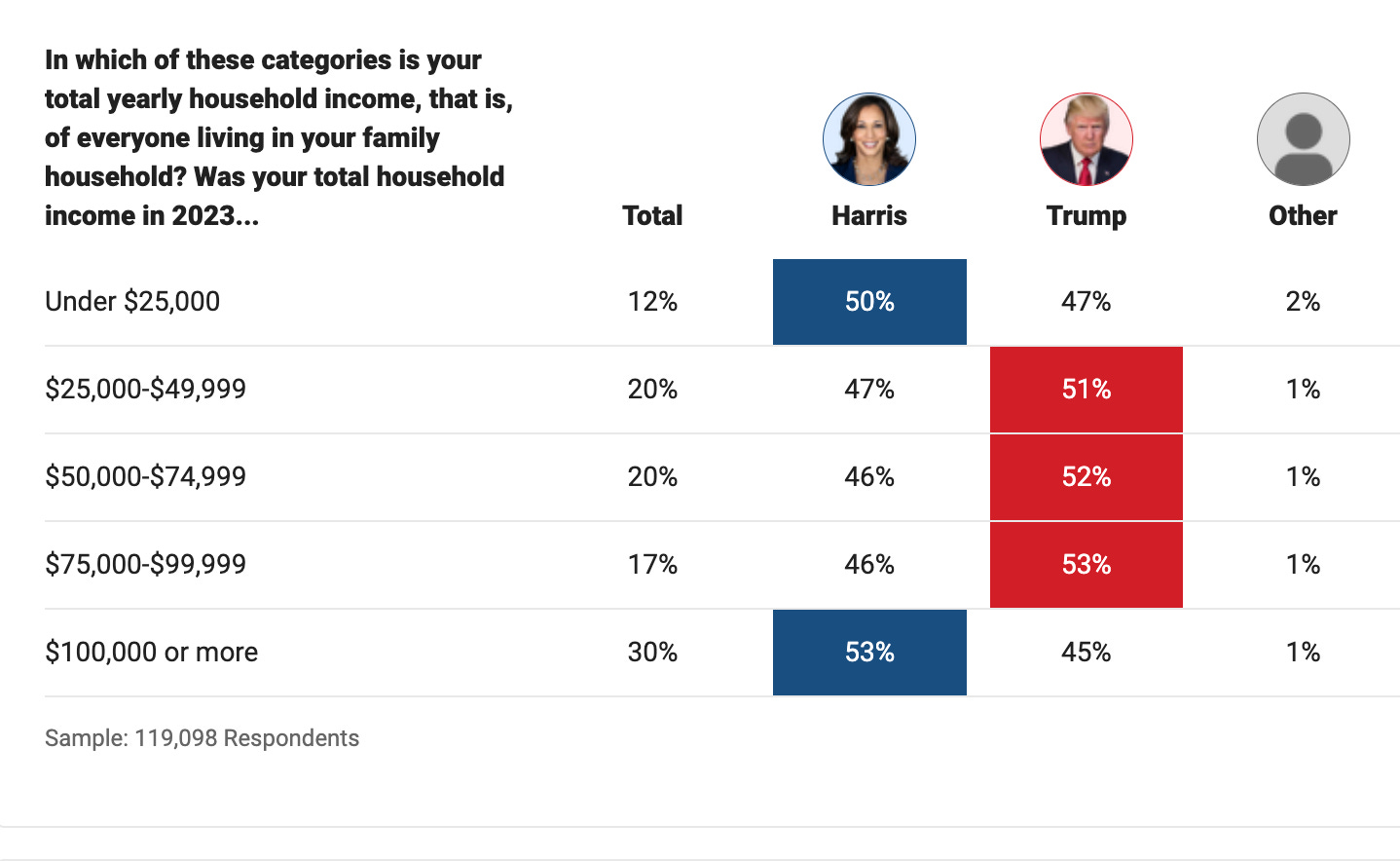
There’s a reason that parents, those in the suburbs, and blue-collar families voted for Trump, and it’s not greed. To them, it’s a question of survival. (Yes, this is nonsensical to trust Trump with the American economy, and I’ll get to that, I promise. But I’m gunna give you an overview first.)
“The state of democracy”
This democratic talking point (and reality, btw) did turn out democrats to the voting booth… but not in big enough numbers, and definitely not in pandemic-era numbers. Ringing the bell of Donald Trump as a urgent threat… is fatiguing. (More on voter turnout below.)
Immigration
It’s no secret that Trumps rants about deportation gained him the White House once before, and probably did again. I have much to say on this issue, but I’ll keep it brief. I live in Aurora, Colorado, the town which Trump has unceremoniously sh*t upon many times, including in a visit to the outskirts of town. (He never did go into the “gang infested” center.) He also plans to send the National Guard to my city once he’s inaugurated. So, I can tell you with authority that Aurora, Colorado, a suburb of Denver with 400,000 residents that sits in the shadow of the rocky mountains, has not been overrun by Venezuelan gangs and I love living here.
Fear will do many things, and fear of the outsider will make those who feel like cultural outsiders suddenly feel like insiders again. It’s a cheat to belonging. And Trump plays to the fears of his audience like no other politician can.
Here’s what the ACLU has to say about Trump’s immigration policy.
Religious Affiliation
I know that I’m preaching to the choir here, but if you are Christian, you are still more likely to vote for a Republican. I find the Fox News religion polling more interesting than other sites because I imagine it to gather more information from religious people (just my own bias talking). They found that 70% of White Protestants and 60% of White Catholics voted for Trump. In fact, among my kin, the white American evangelicals, “About 8 in 10 of them supported him nationally, larger than his margin in 2020,” according to the Washington Post.
Not National Abortion Rights
While many women and Democratic voters seemed to care a lot about Roe v. Wade, the concern seems to have skipped Republican women for one important reason: the majority of Trump voters voted to pass amendments in their states to protect a woman’s right to abortion. It seems that abortion is no longer considered a national decision. Even abortion advocates have taken up the mantle in state legislatures instead. So those who voted for Trump who believe in the right to abortion felt no incoherence in their voting because they did vote for abortion rights. And, don’t forget, Trump turned Pro-choice candidate mid-way through his run. So voters who cared about abortion and liked Trump could have it both ways.
How did the polls get it so wrong (again)?
Maybe they did, maybe they didn’t. Pollsters seem to be relying heavily on the margin of error to say, well, actually, we were closer than you think… but then again, they’re also saying, it was simply “too close to call.”4 So not sure we’re going to get a great answer to this question anytime soon. But to me, this question is starting to sound like a 10-year-old demanding to know why his magic eight ball was wrong.
The answer: they just got it wrong. End of story, I guess.
Is Harris’s loss Biden’s fault?
Probably. Democratic strategist James Carville says so. (Others agree.)Dems should’ve had a primary. We should’ve given Harris a chance to run for an entire cycle. We should’ve would’ve could’ve. I know the appeal of blaming, but unfortunately, our magic eight ball is faulty. We just don’t know.
Reflection
On election night, my husband and I shared cheese and wine with two dear friends. We mostly watched the Colorado Avalanche (hockey), but occasionally we checked our phones as vote counts were tallied around the country. By 10:30PM, I knew Harris had lost and that, despite every prediction and despite my own activism and the deep dread that accompanied it, Donald J. Trump would be America’s next president.
I hate this result. So much. It still feels surreal to me, and as I said, I’m still angry and mourning. I was shocked and not surprised. I understood the chance he had to win because I have lovely, smart people in my life who voted differently than me, and even though I vehemently disagree with their vote, I love them anyway. Being connected to white American evangelicalism gives you a unique view into how the other side of the electorate thinks and while I sometimes loathe my former religious ties (SO DEPRESSING), it can be useful. So yes, I was shocked and not surprised.
I have seen rumors floating around of voter fraud, election interference, etc. from some democratic voters who are casting shade on Trump’s victory. If there is compelling evidence of that—like the time that one Oregonian set fire to hundreds of mail-in ballot drop boxes—then, by all means, please share it. For my part, I doubt these reports, mostly because even if there was interference, the disappearance of millions of votes would be noticed by election officers who have spent the last four years shoring up their systems against unrelenting criticism from the other side of the aisle. State election boards were prepared. Really.
The truth is, Trump won by a LANDSLIDE. His win was no counting error. (Unfortunately!!!!)
Equally, I believe Democrats could have beaten him. Why? Because Democratic voter turnout was terrible. In 2020, 81 MILLION Democrats voted for Biden. In 2024, that number dropped to ~72 million voters for Harris. In contrast, the number of votes for Trump largely remained steady (74 million in 2020, 75 million in 2024).
10 million Democratic voters didn’t show up to the booth. And that is the reason Democrats did not win the 2024 election.
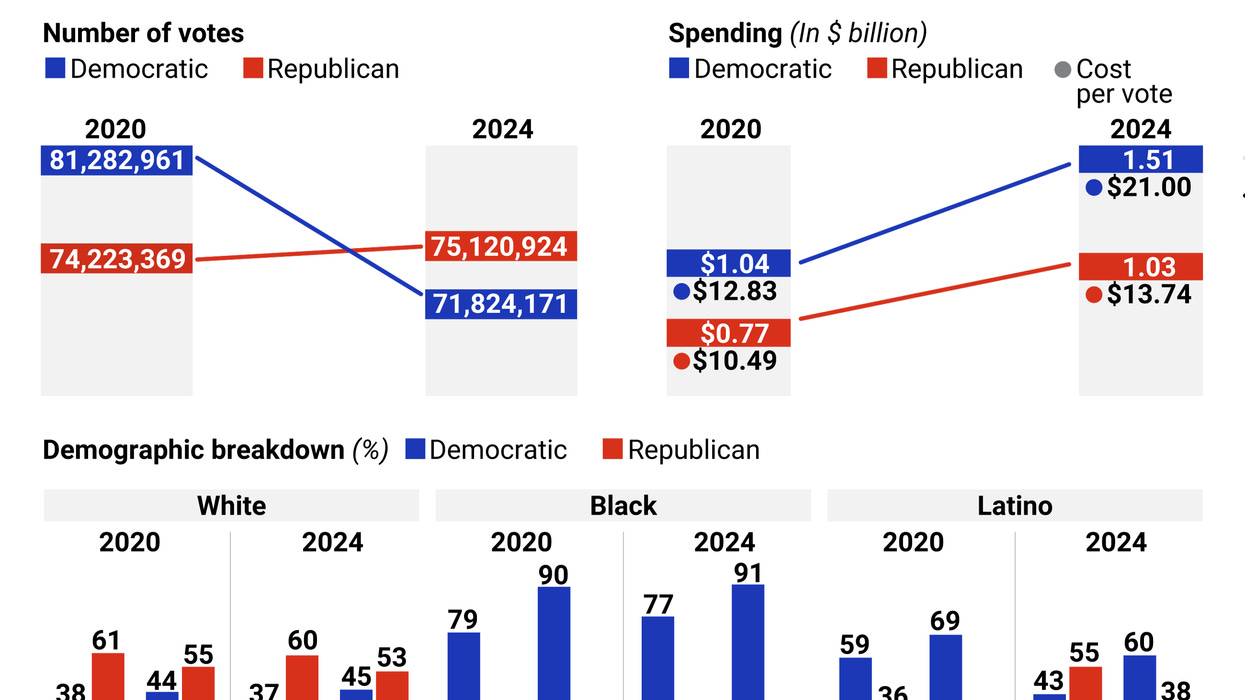
So, the question is: why? Why didn’t those voters show up for Harris?
Maybe it’s racism, maybe sexism. Maybe it’s the fact that she is a former prosecutor, a challenging career for a Democrat to defend to low-income BIPOC voters. Maybe it’s Biden’s unpopularity and his determination not to step down as the nominee until July. It’s likely all of the above.
But if I had to guess why Democrats didn’t come out to vote, I’d say that democrats have lost their voice and confused their story.5 Rather than leaning into their message of freedom and justice for all people, democrats ran ads responding to concerns about immigration, telling constituents that they’d always been tough on crime and believed in deportation. In other words, the democratic message was led by republican concerns. Rather than affirming the positives of being a democrat—taxing the richest 1% to fund social programs for the poor! healthcare despite preconditions! public education for every human! a new start for immigrants! the freedom to read whatever we want because every voice matters!—we ceded too much airtime to the hateful, dehumanizing rhetoric of our opponents.
I do not mean that we cannot be sharp to our opponents; I just wonder if the Democratic our message was weighed down in too many Republican concerns. Dems did not lead with their unique story, unique goals, or unique character as a political party. Rather than assuaging fear with a different, truer story of the American dream, Dems ignored the fears of millions of Americans and spent too much time defending the last administration (“The inflation rate is only two percent! What’s wrong with you?”).
Worse, the tone of Democrats was patronizing and demeaning. Because apparently, Democrats are the bourgeoisie now, the comfortable upper, middle, and educated class, and we believe we know better.
And I’m willing to concede that in some instances, Dems do know better. I’m shocked that voters bought into Trump’s “concept of a plan” to fix inflation and the American economy by imposing tariffs. But apparently, MILLIONS of Americans are afraid and they’re not sure that they and their families can survive this American economy. Some of them aren’t making it. And they blame Biden for their situation—and by proxy, Harris—for the pandemic economy which Trump handed him, however nonsensical that conclusion is.
Whatever else you think of Trump, I think it’s reasonable to say that voters believed that Trump and the GOP listened better and would act on their behalf. Voters believed that Trump and his party took their concerns seriously. They did not feel lectured by GOP leaders, unlike how they felt when hearing from Democratic leaders who were so quick to offer tired and complex explanations of why they shouldn’t feel bad about this economy, but should be happy with what they’ve got because Europe’s inflation rate is worse. We’re better than ever! Really!
Once again, as so many populist (fascist?) leaders have done before him, Trump made himself appear approachable, trustworthy, and relatable in a way that Democrats did not. To them, he’s Uncle Don. He’s been there, and he gets it. They simply like and trust him (I KNOW), and there might not be much more to their decision than that. Sigh.
After compiling this analysis, I admit that I’m still baffled by the decision made by the majority of Americans. Why do they trust him? Why not this smart, kind Black-South Asian woman? In my mind, there’s no contest. She would do it better.
But despite my disagreement, bafflement, anger, and yes, my own fears, I am still called to practice empathy and curiosity—even now.
I hope we can learn to receive the results of this election as a cry for help from our neighbors. They need help, and they are afraid. In fact, that’s true for every one of our neighbors, whatever way they voted. But for those neighbors who did vote for Trump and hang his flag in their front windows, they are soon about to discover that their presidential savior will not be able to fulfill his every promise. He does not care about the people who voted for him, even if they’re convinced he does. And I believe some will come to—or already are—regret their vote.
If/when our neighbors change their minds, let us be ready to embrace them—with truth, justice, and empathy. And if they never do? The same code of ethics apply. Whether you voted for Trump or Harris, I will tell you the truth, I will fight for justice, and I will extend empathy without holding back.
That is the way of Jesus who, for the joy set before him, endured the cross. We keep going, as He did.
Warmly, Liz Charlotte Grant
P.S. As we enter this moment where world politics seems to be leaning toward fascism (for real), I have found the podcast “The Rise of Bonhoeffer” immensely informative and interesting. (It’s not by Eric Metaxas, thank God. Instead, it’s a podcast that gives voice to EVERY OTHER BONHOEFFER SCHOLAR, thank God again.)
https://www.cnn.com/interactive/2024/politics/2020-2016-exit-polls-2024-dg/
https://www.forbes.com/sites/bowmanmarsico/2024/11/12/the-exit-polls-from-a-to-z/
https://www.bbc.com/news/articles/c0lp48ldgyeo
New York Magazine says: “All in all, the Trump-Harris contest was a mixed bag for pollsters and those who slice and dice their data. But nobody should feel misled. It was truly too close to call.” (The “should” really gets me here. “Stop feeling like that, get over it.” *eye roll*)
I suspect that the conflict within the Democratic party around the conflict between Gaza and Israel also played a role in lower voter turnout, and I really hope that someone digs into that element of this election soon.




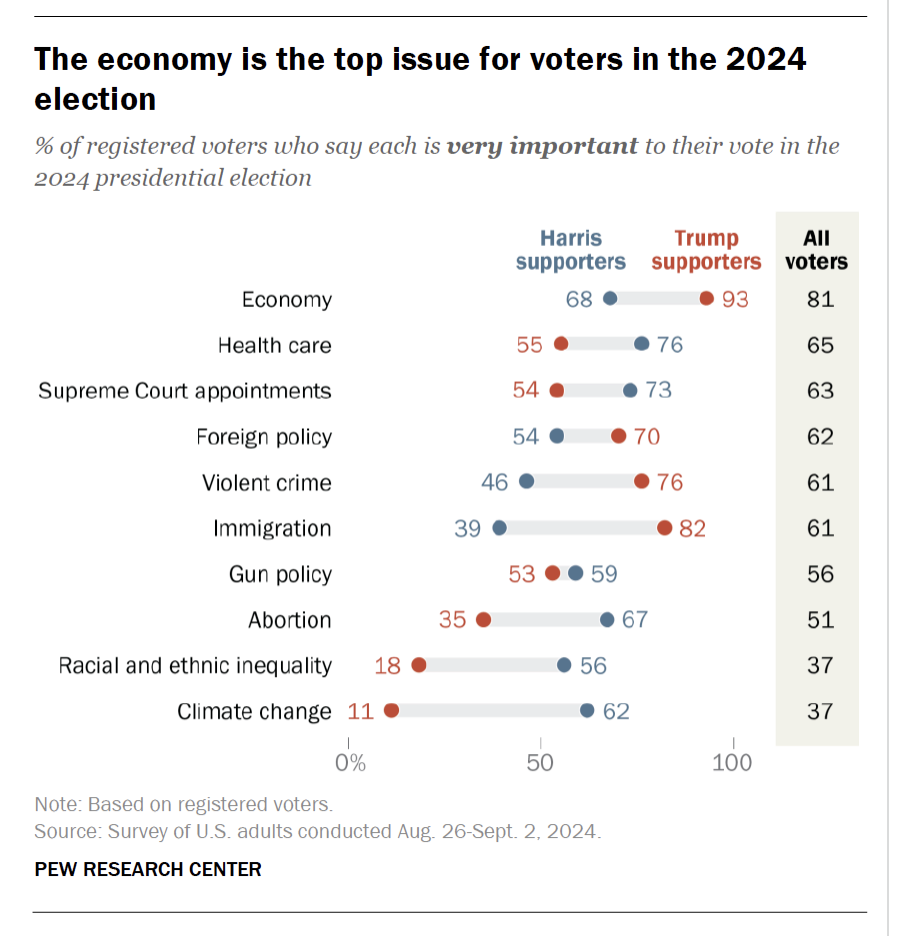
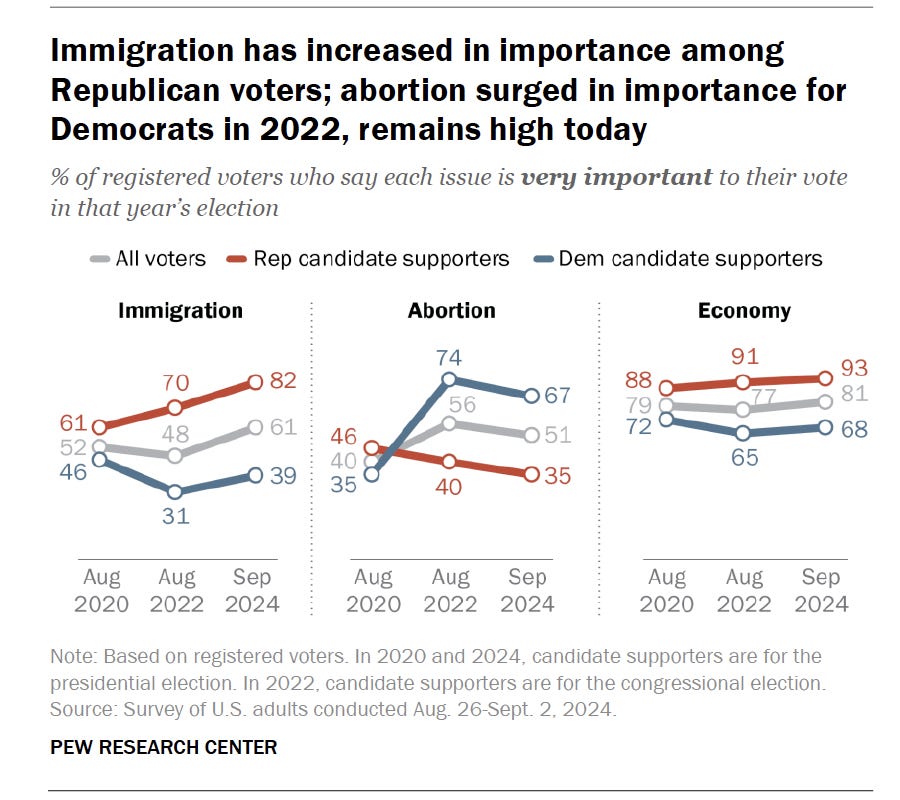
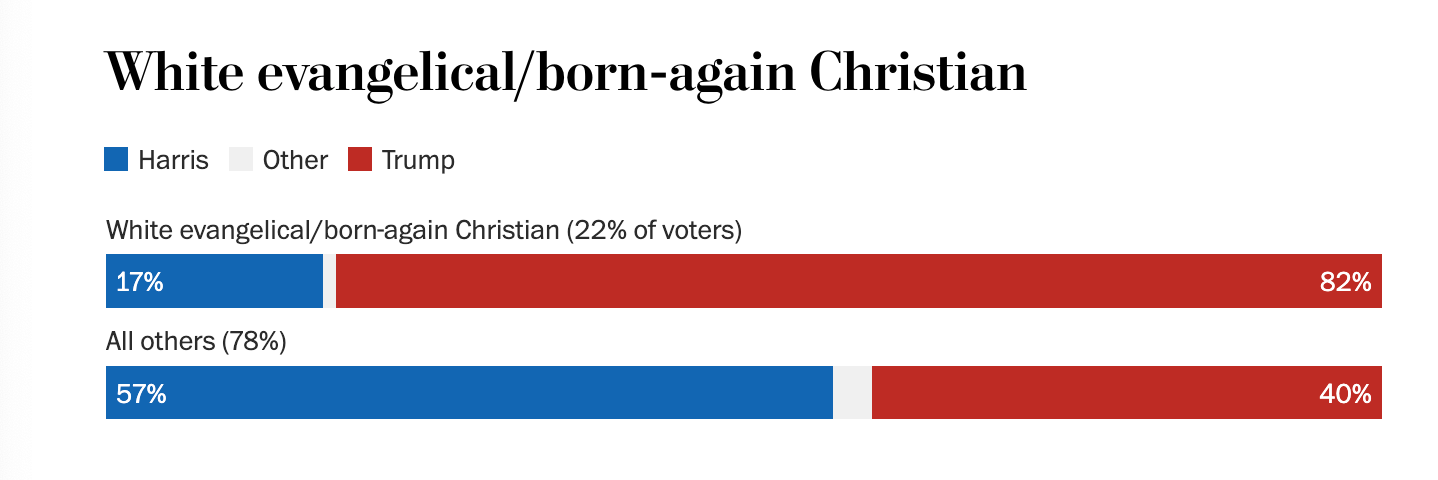



Your note on empathy is going to be essential. I so agree that many are about to feel wrecked with grief and regret for their decision. It's so easy to want them to feel that immensely. Receiving their grief with empathy will be the hard thing but the right thing 🫶🏻
Thank you for all of the work and thoughtfulness you put into this piece. It truly is helping me have more empathy for my neighbors!